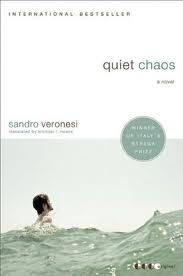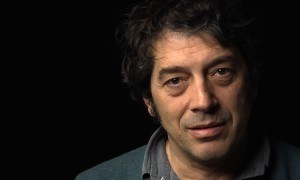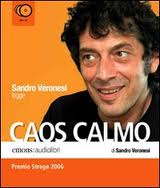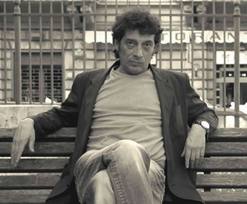In the field of mental health, what were once emotions are now symptoms. With a push from the pharmas, feelings to be endured get pathologized as illnesses to be treated. In 2013, the Diagnostic and Statistical Manual of Mental Disorders, the bible for mental health practitioners, will add a new class of bereavement-related disorders. A recent study published by the Columbia University School of Social work claims that at least 10% of bereaved people suffer from “complicated grief” – incredulity and rage, estrangement, void anxiety.
 Pietro Paladini, the 43-year old narrator of Sandro Veronesi’s Strega Prize-winning fifth novel Quiet Chaos, seems to have the opposite problem — one we usually regard as a moral failing if not an indication that a person has “a piece missing.” He feels no grief. Its absence deeply troubles him. In chapter one, he describes the recent summer day at the beach when he followed his impetuous brother Carlo into rough surf to save the lives of two women. When Pietro returns to his house, he learns that Lara, his fiancée and the mother of his 10-year old daughter Claudia, has dropped dead. They had been together for 12 years. Claudia witnessed Lara’s collapse.
Pietro Paladini, the 43-year old narrator of Sandro Veronesi’s Strega Prize-winning fifth novel Quiet Chaos, seems to have the opposite problem — one we usually regard as a moral failing if not an indication that a person has “a piece missing.” He feels no grief. Its absence deeply troubles him. In chapter one, he describes the recent summer day at the beach when he followed his impetuous brother Carlo into rough surf to save the lives of two women. When Pietro returns to his house, he learns that Lara, his fiancée and the mother of his 10-year old daughter Claudia, has dropped dead. They had been together for 12 years. Claudia witnessed Lara’s collapse.
Two weeks later, having returned to Milan, Pietro takes Claudia to her first day at school. Although he is a senior executive at a cable TV and entertainment conglomerate, Pietro decides not to go to the office. In fact, he spends the entire first day in his car and a café across the street from Claudia’s school. For the next few months, he does the same thing, conducting business on his cellphone and the fax machine in his car. The narrative describes events and thoughts as they occur.
Pietro describes his state as one of “no pain: I continue to feel like a man who fell off the roof and after standing back up can’t stop feeling all over his body, finding it hard to believe he was unharmed.”
Quiet Chaos is the type of novel that typically elicits the following reaction from most literary (I use the term loosely) agents: “Great writing. But it’s hard for the reader to identify with someone who doesn’t feel grief – and doesn’t develop in that direction. And it’s too interior. And the other characters just pass in and out – they aren’t colored in. And also, nothing happens.” Not surprisingly, the novel was ignored in the USA (with the exception of tone-deaf dismissals in Publishers Weekly and Kirkus.)
 But Veronesi wrote Quiet Chaos to tangle with our values and expectations, knowing that grieving is a distressing experience and a nettlesome subject for us – and that the role of the literary artist is not to resolve our anxieties and deflate our fears so much as to help us see what is actual through renewed and often strange language. Quiet Chaos is eccentric medicine. Its premise crosses the margin of the comically surreal – though it certainly seemed a sufficiently “real” situation to Antonello Grimaldi who directed the film version of “Caos calmo” in 2008 (the novel was originally published in Italy in 2005).
But Veronesi wrote Quiet Chaos to tangle with our values and expectations, knowing that grieving is a distressing experience and a nettlesome subject for us – and that the role of the literary artist is not to resolve our anxieties and deflate our fears so much as to help us see what is actual through renewed and often strange language. Quiet Chaos is eccentric medicine. Its premise crosses the margin of the comically surreal – though it certainly seemed a sufficiently “real” situation to Antonello Grimaldi who directed the film version of “Caos calmo” in 2008 (the novel was originally published in Italy in 2005).
What does Pietro mean by “quiet chaos?” He observes the schoolchildren as they leave school on that first day:
“At four twenty-five there’s the usual pandemonium, just as I remember from the times I used to come to pick up Claudia. The chaos. But a joyous chaos, drama-free, because the children, even if they haven’t exited the school yet, have already started diffusing the substance that enables them to survive among adults, the natural antihistamine that helps parents relax and regress, making them not only compatible but also complicit with the chaos to which the children feel entitled: the chaos of their little rooms before they’re ordered to straighten them out, the chaos of their backpacks when they get home from school, the folders, the pencil boxes, the notebooks; the simple and fundamentally quiet chaos in which they would live all the time, if they were allowed, without completely understanding most of the things that happen but, for this reason precisely, able to live very intensely … Quiet chaos … this pause that continues to save me from the grief that everyone, yes, everyone imagines I’m feeling and that’s not how it is yet.”
 Quiet Chaos is very much like one of those backpacks: an entire private life, opening onto an “adult” world, is packed into a very small, disheveled space. Life lived with intensity – without the expectation of full understanding, but rather, of suddenly seeing what is there. Pietro speaks mainly from his car and a nearby park bench – where he is visited first by his office colleagues, and later by his boss. Each of them is agonizing over the pending merger of their company – livelihoods in the balance, stresses on their psyches and relationships. Pietro becomes a neighborhood fixture, perceived as a model father, protecting his daughter. But he acknowledges to us the “misunderstandings of my presumed suffering.” Soon, even the two competing business moguls attempting to control the merger drop by to consult with him. He also is approached by the woman he saved from drowning.
Quiet Chaos is very much like one of those backpacks: an entire private life, opening onto an “adult” world, is packed into a very small, disheveled space. Life lived with intensity – without the expectation of full understanding, but rather, of suddenly seeing what is there. Pietro speaks mainly from his car and a nearby park bench – where he is visited first by his office colleagues, and later by his boss. Each of them is agonizing over the pending merger of their company – livelihoods in the balance, stresses on their psyches and relationships. Pietro becomes a neighborhood fixture, perceived as a model father, protecting his daughter. But he acknowledges to us the “misunderstandings of my presumed suffering.” Soon, even the two competing business moguls attempting to control the merger drop by to consult with him. He also is approached by the woman he saved from drowning.
The novel’s genius is its ability to draw us into the back seat of Pietro’s car – and to retard our judgment of Pietro. To fix the atmosphere of quiet chaos and the stretching of time, Veronesi relies on a long chain of small encounters, but also, some rather tedious, streaming monologues. Even granting him the artistic necessity for the latter’s stretches, they sometimes feel gratuitous when repetition of tone and argument set in. There are also sections where the narrative purports to occur instantaneously with the action – that it is the action – and the mechanics of this shift sounded intrusive to me. But this is a voluble novel after all. It proceeds through snappy dialogue, acute reflection, and sudden action. At the core, Pietro pivots between tranquility and tension. In a remarkable conversation with his brother, Pietro’s pique spills over:
“So let me see if I understood you correctly. You are supposedly the spokesman for a general feeling of concern about me, which could be summarized as follows: if I were to suffer but I went to the office anyway and hung in there and said that life goes on and took sleeping pills and in the meanwhile Claudia were to appear indecisive and apathetic and stopped eating, you would all be happier and give me the name of a psychologist that she should see; if I were ‘camped out here like a homeless man,’ as you put it, because I was overcome by grief, you would be moderately concerned and you would give me the name of a psychologist that I should see; but the fact that I’m here and that I’m not feeling bad, and that not even Claudia is feeling bad, and that there is no need for psychologists, this you find much more troubling. Do we have to grieve to set your mind at rest?”
 A tension mounts as we try to find our footing between the apparent sincerity and sense of Pietro’s odd routines and their untenability. The corporate merger subplot thickens into intrigue. In one episode, Pietro agrees to attend a support group dealing with the issue of explaining death to children. He sees that a drop of blood is slowly dripping from the nose of a woman sitting at his table. For Pietro, it is an image of “gaping soullessness” – and he passes out. The child never quite gets over the soullessness he discovers in the world. Is his defense a plodding, indirect approach to tragedy? Veronesi’s story concludes by completing the implications of an implacable situation – and yet it is a satisfying end for the reader. I will only say that the disruption of Pietro’s daily habits occurs through the innocent and sage intuitions of a child.
A tension mounts as we try to find our footing between the apparent sincerity and sense of Pietro’s odd routines and their untenability. The corporate merger subplot thickens into intrigue. In one episode, Pietro agrees to attend a support group dealing with the issue of explaining death to children. He sees that a drop of blood is slowly dripping from the nose of a woman sitting at his table. For Pietro, it is an image of “gaping soullessness” – and he passes out. The child never quite gets over the soullessness he discovers in the world. Is his defense a plodding, indirect approach to tragedy? Veronesi’s story concludes by completing the implications of an implacable situation – and yet it is a satisfying end for the reader. I will only say that the disruption of Pietro’s daily habits occurs through the innocent and sage intuitions of a child.
There is an Italian palindrome: I topi non avevano nipoti — “the mice had no nephews” in English. Pietro and Claudia play with both the phrase and the idea of reversibility. I experienced the strangest sensation at the end of Quiet Chaos — that a reconciliation may create the feeling of reversibility. Pietro says at the end, “I took advantage of the situation, of the chaos generated by that damned merger; but it was a reversible chaos … On Wednesday the merger will be done and I have to return to work anyway … All I did was the right thing, the one that was most convenient for me. All I did was avoid a trap.”
[Published by Ecco Books on April 12, 2011. 432 pages, $13.99 paperback original]